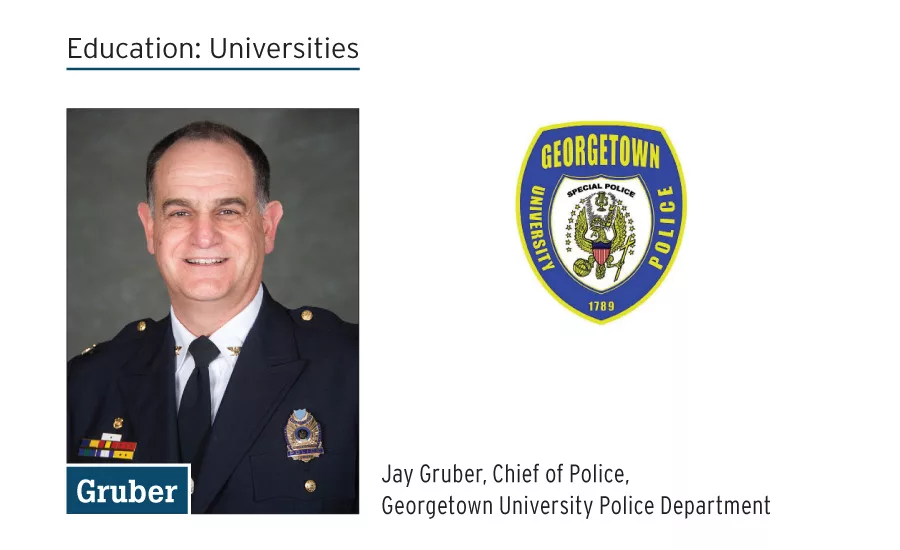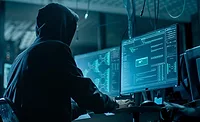Jay Gruber: Georgetown University's Watchman

Now in his 30th year of university policing, Georgetown University Police Department’s Chief of Police, Jay Gruber, knows a bit about campus security. “It’s important to get the students to understand that the police department is not their adversary, but their partner, and that we’re here to support them and help meet their needs and keep them safe. It’s what I believe in,” says Gruber. “We’re here to meet a very specific need and to really focus on our students and our community.”
Partnering with other departments on campus is an integral part of security’s mission to make sure the learning and living environments at Georgetown are safe and secure. “Those partnerships are very, very important,” Gruber says. “Especially at the university, you really need to leverage your partners because they have access to people and programs that can really enhance the mission of the police department.”
Gruber enjoys the challenges that come with dealing with external partners, technology, other departments on campus, and the students themselves. “It’s like constructing a puzzle. You have to have all of these different components and make sure you’re doing the right thing,” he says. “You take all the disparate pieces and put them together into a coherent plan, and yet that plan is very simple.”
Getting funding for the police department and keeping students safe and secure while in an open environment are other major challenges that Gruber deals with in his sector. “You don’t often find universities where all the buildings are locked,” he says. “They want to be open, so that balance of keeping an open campus while keeping the campus safe is a risk you have to accept. We can mitigate it to a degree, but we have to accept it.”
The police department at Georgetown has a long history, beginning with watchmen right after the Civil War. “People would close the gates at night and make sure the gas lights were lit,” Gruber says. “For a department to survive, it has to continually reinvent itself. Over several years, I’ve had the opportunity to reinvent this department from a security department to a professional police organization.”
Among his peers in Washington D.C., Gruber feels his department’s reputation has grown. “Currently I’m the chairperson of the chiefs of police group here in Washington D.C. for our consortium of universities,” he says. “I’ve had an opportunity to really showcase a lot of the things we’ve been doing here, and my peers like what they see. There’s much more collaboration as we’ve raised the bar in our department.”
Being available 24/7 and promoting programs in the university community helps staff and students know the police department cares about them and their well-being. Along with crime prevention programs, the department offers an active shooter training program, self-defense classes, and Gruber meets up with a student safety advisory board every couple weeks to get feedback. Additionally, “I’ve got trained officers here called S.A.R.T. officers, which stands for Sexual Assault Response Team, that are highly trained to deal with sexual assault survivors and their needs,” says Gruber.
The police department brings value in keeping the campus’s security reputation intact so researchers and students will want to come there. “Another type of value that we bring to the organization is, because we’re a proprietary police department and not a metropolitan police department that has assigned a couple of people to the university, we can really drill down,” Gruber says. “We can do crime risk assessments in different departments. Every building on campus has an officer who does programming and meetings in those buildings.”
The toughest part of the job is “probably trying to be ubiquitous,” says Gruber. “It’s trying to do everything that we want to do all the time. We have a limited amount of people to cover the spectrum of a whole day and a large, urban campus. The difficulty is we can’t be everywhere at once, and we’d really like to. You’re dealing with limited capital and limited budgets, so you really can’t be everywhere at once, and that’s probably one of the hardest parts of the job.”
In his spare time, Gruber volunteers for a local rescue squad in his county. “I’ve been an EMT for about 30 years, and I really enjoy doing that. In fact, my son just joined as a cadet. During the month of my 30th anniversary, he turned 16 and joined the rescue squad, which made me very proud,” Gruber says. He also enjoys coaching his children’s soccer teams.
Security Scorecard
Annual Revenue: $1 billion
Security Budget: $6 million
Critical Issues
-
Active Shooter
-
Budget
-
Security Technologies
Looking for a reprint of this article?
From high-res PDFs to custom plaques, order your copy today!




